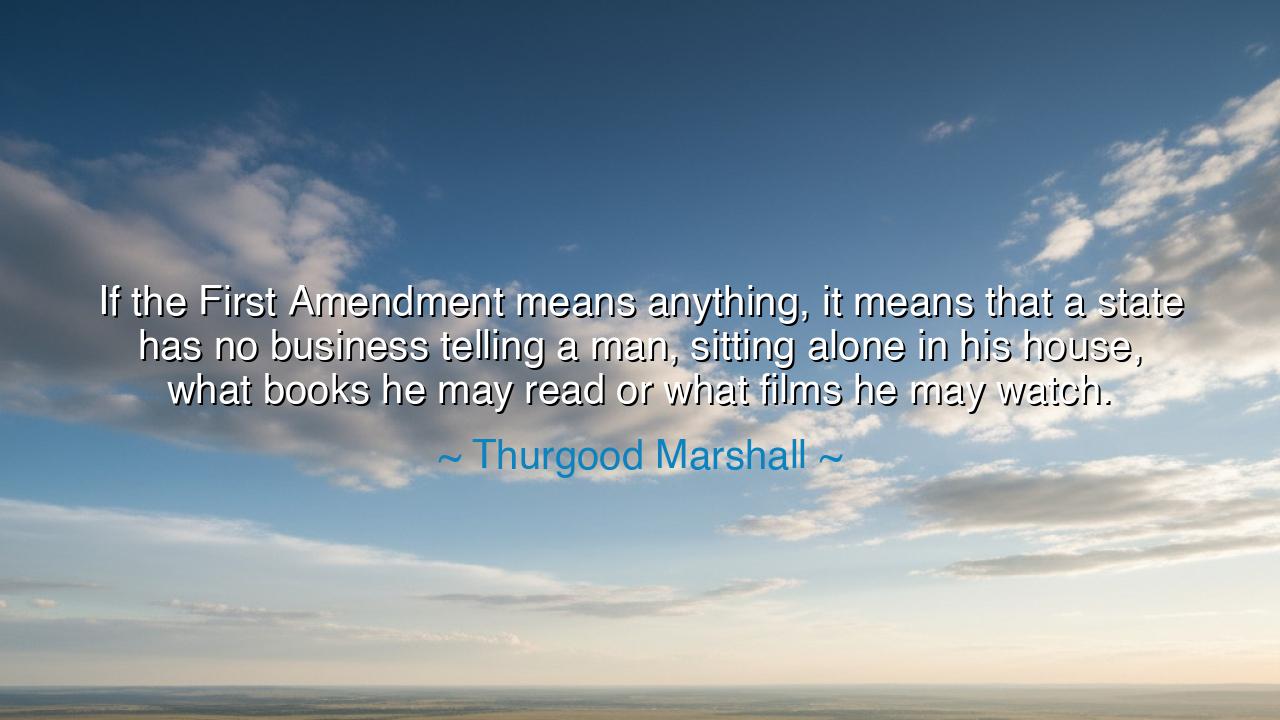
If the First Amendment means anything, it means that a state has
If the First Amendment means anything, it means that a state has no business telling a man, sitting alone in his house, what books he may read or what films he may watch.






"If the First Amendment means anything, it means that a state has no business telling a man, sitting alone in his house, what books he may read or what films he may watch." These profound words by Thurgood Marshall, one of the greatest legal minds in American history, speak to the very heart of freedom—specifically, the freedom of expression and the right to personal thought. The First Amendment is the foundation upon which the United States was built, ensuring that every individual is free to think, believe, and express their ideas without fear of government interference. Marshall's statement echoes the timeless truth that the state has no right to dictate the thoughts of an individual, especially in the privacy of their own home. It is an appeal to the deepest form of freedom—the freedom of the mind.
In the ancient world, the importance of freedom of thought was recognized, but not always fully realized. The Greeks, with their commitment to philosophical inquiry and the search for truth, valued the free exchange of ideas. However, even in Athens, where democracy flourished, there were limitations on speech and thought. The philosopher Socrates was condemned to death for challenging the prevailing beliefs of the time, accused of corrupting the youth with his questioning of traditional values. His tragic end stands as a reminder that while the quest for knowledge and expression is vital, it has often been threatened by those in power who seek to control the thoughts of the people. Marshall’s words remind us that we must continually protect the sacred right to think freely, for it is essential to the health of any society.
Consider the era of McCarthyism in the United States, a dark chapter where the government sought to control not only what people said but also what they read and watched. During the Red Scare, fear of communism led to widespread censorship and the blacklisting of artists, writers, and intellectuals. Books were burned, and films were censored in the name of protecting national security. The invasion of privacy into what individuals could consume, think, or believe became an assault on the very fabric of freedom. Thurgood Marshall understood that such actions were not just an infringement on individual rights but a dangerous and unjust step toward tyranny. When we allow the state to dictate the ideas we are exposed to, we lose the very freedom that allows us to grow, question, and evolve as individuals.
Marshall’s statement, though grounded in the context of the United States and the First Amendment, resonates deeply with universal principles of freedom that have been central to societies throughout history. Censorship, whether in the form of government-imposed restrictions or the social pressures that influence the free exchange of ideas, has always been seen as a threat to the well-being of the individual and the society as a whole. The Enlightenment thinkers, like Voltaire, argued fiercely for the right to freedom of speech and expression, famously saying, "I disapprove of what you say, but I will defend to the death your right to say it." These timeless values continue to be tested in every generation, reminding us that the freedom of the mind must be guarded vigilantly.
One of the most poignant lessons from history regarding the power of the mind and freedom of thought can be found in the story of Nelson Mandela, whose fight for the freedom of South Africa was not just a political struggle but a battle to protect the right of the people to think freely. During his time in prison, Mandela was denied access to books and intellectual material that might have broadened his perspective or fueled his ideas. However, the government could not control his mind. Through his connection with fellow prisoners and his inner strength, Mandela continued to think and dream of a free South Africa, showing that even the most oppressive regimes cannot ultimately suppress the human spirit and intellect. His ability to retain his freedom of thought, despite physical imprisonment, exemplifies the power of the mind when left unchained.
The lesson in Marshall’s quote is clear: freedom of expression is not just about speech—it is about the very right to think, imagine, and create without the fear of government censorship or social retribution. The state has no place in regulating the ideas we hold, the books we read, or the films we watch. This is not just a legal matter, but a moral imperative—the right to think freely is essential to our human dignity. The government’s role should not be to control thought, but to protect the freedom to think, discuss, and explore ideas without restraint.
In our own lives, we must be ever vigilant about the freedoms we hold dear. We must recognize that the right to free expression is not something that can be taken for granted. Let us ensure that we foster an environment where ideas, even those that challenge the status quo, are welcomed, and where the mind remains free from the control of others. Freedom of thought is a foundation of progress—whether in the realms of science, art, or politics—and it is only by preserving this freedom that we can continue to evolve as individuals and as a society. As we stand in defense of our own rights, we must also stand in defense of the freedom of others, for it is through the protection of thought that we ensure the growth and strength of all.






AAdministratorAdministrator
Welcome, honored guests. Please leave a comment, we will respond soon